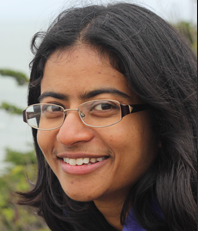
Amrita Dhar
Assistant Professor, Department of Literature

- Q&A
- Biography
Q&A
What excites you most about joining our School of Arts and Humanities community?
“I absolutely love how multilingual this place is, what a variety of interests and excellences there is in it (the expertise across genres and across creative and scholarly work), and how dynamic the collective imagination of this place is. I’ve so enjoyed meeting everyone in Arts and Humanities that I have met so far, and I really look forward to meeting other members of this amazing community.”
Why did you choose your field?
“It was really John Milton’s poetry, particularly the blind epic poem ‘Paradise Lost,’ that set me on this path, along with some transformatively brilliant teachers and tutors in my undergraduate institution. My parents, then children, were refugees of the 1947 Partition. I thus come from a family of very modest financial means. All the stories I heard from my parents and grandparents as a little girl were as much about hunger, dispossession, and loss as about survival, stubbornness, and joy. Research-level academia was the last thing that children of my background, especially girls of my background, were encouraged to think about. If we were encouraged to think about a career on our own terms at all. And then, in college, I fell in love with a blind seventeenth-century poet writing in not a single language that was by family inheritance my own. The rest is travel—across continents, varied intellectual landscapes, likelihoods and unlikelihoods, and more love. I got into the absolute pleasures of archival research while at Cambridge, where Milton also studied. And at Michigan, I learnt how much of my research questions were indeed questions in disability studies. Today, I study and teach in early modern literatures, poetry and poetics, interdisciplinary disability studies, migration studies, and critical race studies.”
Why should students consider studying the arts and humanities?
“Why should students choose the arts and humanities? Oh, the reasons are too numerous to name! But here are the most important reasons:
- You may not think this yet, but I assure you that the capacity for aesthetic pleasure and intellectual enjoyment are skills for life. And this is where you learn them. Imagine coming of age knowing that you will never be alone, because you have the company of centuries of thinkers and poets and artists walking alongside you, always.
- You will also learn here a kind of criticality and self-reflexivity that is (unfortunately) unrivalled in any other disciplinary strand. You will be equipped to think along the lines of not only “Can we do x to solve y problem?” but also “Should we do x to solve y problem?” Because you will develop a holistic imagination about the human rewards and costs of proposed solutions, and thus be able to think of genuine solutions for our 21st century world.
- You will be in a position to go wherever else your ongoing career takes you—whether medicine, or art, or law, or further studies, or policy, or architecture, or engineering, or you name it—with a degree of articulateness and clarity that again, is almost uniquely possible only through a thorough arts and humanities education.
What research or project are you working on currently?
“I am completing my monograph project on John Milton’s blind poetry, which investigates the workings of blindness towards the making of that magnificent poetry. I am also directing the open-access research project Shakespeare in the “Post” Colonies, which is hosting a series of interviews with postcolonial Shakespearean creatives from around the world. We have a stunning list of interviewees, do check the project out!”
What’s your favorite class to teach and why?
“I love teaching undergraduate classes on poetry. In the U.S., students often present with the notion that poetry is not ‘for them’ or that they don’t ‘understand’ poetry. And in my poetry classes, students find out how deeply poetry is ‘for them’ and that they not only ‘understand’ it but can often even do it themselves! And their thrill becomes my thrill. Good poems are artefacts of the deepest critical thinking.”
“I also love teaching classes in health, disability and literature. Students invariably bring to an introductory class on disability studies their personal histories of disability and bodily or cognitive awareness and difference. (One in every five people alive today has a disability. So, of course we all know someone disabled, and we all think about ways of making the world an inclusive and accessible place, whether consciously or not.) At the graduate level, I offer seminars that address the long histories of race-making and disability-making. And my graduate students always teach me at least as much as I teach them.”
What is something about yourself that is not typically included in your bio?
“I am a photographer, environmentalist and environmental archivist; I have a background in human rights activism, especially as it relates to environmental policy.”
Biography
Amrita Dhar is a scholar of early modern literary and cultural studies, including Shakespeare, Milton, 17th century English poetry, the literatures of race-making and proto-empire and disability studies. She earned a Ph.D. in English language and literature from the University of Michigan, and most recently served as assistant professor of English at The Ohio State University.
Raised in Calcutta, India by a family of very modest financial means, Dhar did not imagine a career in academia until her undergraduate studies, when she fell in love with the poetry of John Milton and subsequently began to work in disability studies. Today, Dhar studies and teaches early modern literatures, poetry and poetics, interdisciplinary disability studies, migration studies and critical race studies. She is also an active climber and mountaineer and works in world mountaineering literatures.
